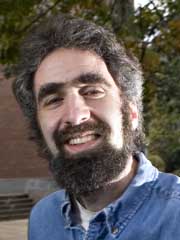Benjamin M. Bolker, Ph.D.
Associate Professor of Theoretical Ecology
College of Liberal Arts and Sciences
2008 Awardee
 As an ecologist, Benjamin Bolker works to understand, measure and explain animal interaction and movement within an environment. As a professor at UF, he’s fostering interaction and the movement of ideas between departments, faculty and students.
As an ecologist, Benjamin Bolker works to understand, measure and explain animal interaction and movement within an environment. As a professor at UF, he’s fostering interaction and the movement of ideas between departments, faculty and students. As boundaries to the flow of information continue to fall, the volume of numbers, figures and statistics can be overwhelming. For biologists, the rush of data can be equally daunting. Through his research, Bolker organizes the wealth of ecological information in a way that bridges the gap between theory and real-life data. Through his work in statistics, Bolker is part of a new wave of statistical ecology, and his research in population and community dynamics recently culminated in his book, Ecological Models and Data in R, which shows biologists across a range of fields how to apply sophisticated statistical tools to their data to develop and test their own theories.
Bolker’s work straddles the fence between biology and mathematics, a field that has become increasingly important in terms of national defense and medical breakthroughs. His most recent research grant, an Integrative Graduate Education and Research Traineeship (IGERT), will bring together investigators and faculty from 12 departments and three colleges.
Bolker has put his theories to work in his research of seed dispersal, the movement of sea turtles, and invasive plants in California grasslands. His research in host-parasite interaction and infectious diseases such as viral and fungal diseases of amphibians has led him to collaborate with yet another group on campus, the Emerging Pathogens Institute at UF.
Bolker is an associate editor for The American Naturalist, a monthly journal about ecology, biology and research methods. Students under Bolker’s tutelage frequently publish in top scientific journals and continue their education as post-docs at such prestigious biology schools as Harvard, Cornell and Cambridge.
In the same way that Bolker has linked biology and mathematics through his statistical research, he has also linked faculty, students and academic departments throughout UF, all in order to spread and organize the flow of information.

